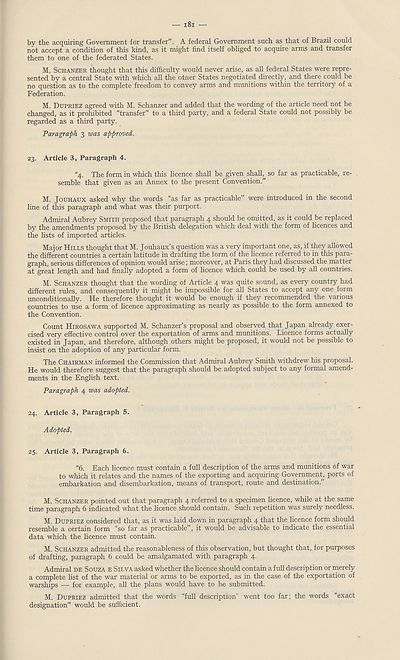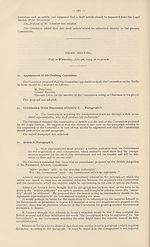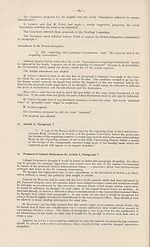Armament > Conference for the control of the international trade in arms, munitions and implements of war
(183)
Download files
Complete book:
Individual page:
Thumbnail gallery: Grid view | List view

181 —
by the acquiring Government for transfer”. A federal Government such as that of Brazil could
not accept a condition of this kind, as it might find itself obliged to acquire arms and transfer
them to one of the federated States.
M. Schanzer thought that this difficulty would never arise, as all federal States were repre¬
sented by a central State with which all the otner States negotiated directly, and there could be
no question as to the complete freedom to convey arms and munitions within the territory of a
Federation.
M. Dupriez agreed with M. Schanzer and added that the wording of the article need not be
changed, as it prohibited “transfer” to a third party, and a federal State could not possibly be
regarded as a third party.
Paragraph 3 was approved.
23. Article 3, Paragraph 4.
“4. The form in which this licence shall be given shall, so far as practicable, re¬
semble that given as an Annex to the present Convention.”
M. Jouhaux asked why the words “as far as practicable” were introduced in the second
line of this paragraph and what was their purport.
Admiral Aubrey Smith proposed that paragraph 4 should be omitted, as it could be replaced
by the amendments proposed by the British delegation which deal with the form of licences and
the lists of imported articles.
Major Hills thought that M. Jouhaux’s question was a very important one, as, if they allowed
the different countries a certain latitude in drafting the form of the licence referred to in this para¬
graph, serious differences of opinion would arise; moreover, at Paris they had discussed the matter
at great length and had finally adopted a form of licence which could be used by all countries.
M. Schanzer thought that the wording of Article 4 was quite sound, as every country had
different rules, and consequently it might be impossible for all States to accept any one form
unconditionally. He therefore thought it would be enough if they recommended the various
countries to use a form of licence approximating as nearly as possible to the form annexed to
the Convention.
Count Hirosawa supported M. Schanzer’s proposal and observed that Japan already exer¬
cised very effective control over the exportation of arms and munitions. Licence forms actually
existed in Japan, and therefore, although others might be proposed, it would not be possible to
insist on the adoption of any particular form.
The Chairman informed the Commission that Admiral Aubrey Smith withdrew his proposal.
He would therefore suggest that the paragraph should be adopted subject to any formal amend¬
ments in the English text.
Paragraph 4 was adopted.
24. Article 3, Paragraph 5.
Adopted.
25. Article 3, Paragraph 6.
“6. Each licence must contain a full description of the arms and munitions of war
to which it relates and the names of the exporting and acquiring Government, ports of
embarkation and disembarkation, means of transport, route and destination.”
M. Schanzer pointed out that paragraph 4 referred to a specimen licence, while at the same
time paragraph 6 indicated what the licence should contain. Such repetition was surely needless.
M. Dupriez considered that, as it was laid down in paragraph 4 that the licence form should
resemble a certain form “so far as practicable”, it would be advisable to indicate the essential
data which the licence must contain.
M. Schanzer admitted the reasonableness of this observation, but thought that, for purposes
of drafting, paragraph 6 could be amalgamated with paragraph 4.
Admiral de Souza e Silva asked whether the licence should contain a full description or merely
a complete list of the war material or arms to be exported, as in the case of the exportation of
warships — for example, all the plans would have to be submitted.
M. Dupriez admitted that the words “full description’ went too far; the words “exact
designation” would be sufficient.
by the acquiring Government for transfer”. A federal Government such as that of Brazil could
not accept a condition of this kind, as it might find itself obliged to acquire arms and transfer
them to one of the federated States.
M. Schanzer thought that this difficulty would never arise, as all federal States were repre¬
sented by a central State with which all the otner States negotiated directly, and there could be
no question as to the complete freedom to convey arms and munitions within the territory of a
Federation.
M. Dupriez agreed with M. Schanzer and added that the wording of the article need not be
changed, as it prohibited “transfer” to a third party, and a federal State could not possibly be
regarded as a third party.
Paragraph 3 was approved.
23. Article 3, Paragraph 4.
“4. The form in which this licence shall be given shall, so far as practicable, re¬
semble that given as an Annex to the present Convention.”
M. Jouhaux asked why the words “as far as practicable” were introduced in the second
line of this paragraph and what was their purport.
Admiral Aubrey Smith proposed that paragraph 4 should be omitted, as it could be replaced
by the amendments proposed by the British delegation which deal with the form of licences and
the lists of imported articles.
Major Hills thought that M. Jouhaux’s question was a very important one, as, if they allowed
the different countries a certain latitude in drafting the form of the licence referred to in this para¬
graph, serious differences of opinion would arise; moreover, at Paris they had discussed the matter
at great length and had finally adopted a form of licence which could be used by all countries.
M. Schanzer thought that the wording of Article 4 was quite sound, as every country had
different rules, and consequently it might be impossible for all States to accept any one form
unconditionally. He therefore thought it would be enough if they recommended the various
countries to use a form of licence approximating as nearly as possible to the form annexed to
the Convention.
Count Hirosawa supported M. Schanzer’s proposal and observed that Japan already exer¬
cised very effective control over the exportation of arms and munitions. Licence forms actually
existed in Japan, and therefore, although others might be proposed, it would not be possible to
insist on the adoption of any particular form.
The Chairman informed the Commission that Admiral Aubrey Smith withdrew his proposal.
He would therefore suggest that the paragraph should be adopted subject to any formal amend¬
ments in the English text.
Paragraph 4 was adopted.
24. Article 3, Paragraph 5.
Adopted.
25. Article 3, Paragraph 6.
“6. Each licence must contain a full description of the arms and munitions of war
to which it relates and the names of the exporting and acquiring Government, ports of
embarkation and disembarkation, means of transport, route and destination.”
M. Schanzer pointed out that paragraph 4 referred to a specimen licence, while at the same
time paragraph 6 indicated what the licence should contain. Such repetition was surely needless.
M. Dupriez considered that, as it was laid down in paragraph 4 that the licence form should
resemble a certain form “so far as practicable”, it would be advisable to indicate the essential
data which the licence must contain.
M. Schanzer admitted the reasonableness of this observation, but thought that, for purposes
of drafting, paragraph 6 could be amalgamated with paragraph 4.
Admiral de Souza e Silva asked whether the licence should contain a full description or merely
a complete list of the war material or arms to be exported, as in the case of the exportation of
warships — for example, all the plans would have to be submitted.
M. Dupriez admitted that the words “full description’ went too far; the words “exact
designation” would be sufficient.
Set display mode to:
![]() Universal Viewer |
Universal Viewer | ![]() Mirador |
Large image | Transcription
Mirador |
Large image | Transcription
Images and transcriptions on this page, including medium image downloads, may be used under the Creative Commons Attribution 4.0 International Licence unless otherwise stated. ![]()
| League of Nations > Armament > Conference for the control of the international trade in arms, munitions and implements of war > (183) |
|---|
| Permanent URL | https://digital.nls.uk/195384142 |
|---|
| Shelfmark | LN.IX |
|---|
| Description | Over 1,200 documents from the non-political organs of the League of Nations that dealt with health, disarmament, economic and financial matters for the duration of the League (1919-1945). Also online are statistical bulletins, essential facts, and an overview of the League by the first Secretary General, Sir Eric Drummond. These items are part of the Official Publications collection at the National Library of Scotland. |
|---|---|
| Additional NLS resources: |
|

